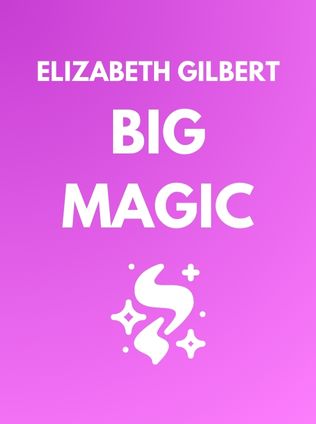
Big Magic
Creative Living Beyond Fear
By Elizabeth Gilbert
Published 09/2015
About the Author
Elizabeth Gilbert, the author of Big Magic, is a renowned American author, celebrated for her unique narrative style and profound insights into life, creativity, and the human spirit. Best known for her memoir Eat, Pray, Love, which became a worldwide bestseller and was later adapted into a feature film, Gilbert has established herself as a voice of inspiration for millions. Her works often explore themes of self-discovery, resilience, and the pursuit of personal fulfillment. In Big Magic, Gilbert delves into the mysteries of creativity, offering readers a guide to unlocking their creative potential through a mix of personal anecdotes, philosophical musings, and practical advice.
Main Idea
At its core, Big Magic is a manifesto for creativity. Gilbert posits that creativity is a mystical force—something she refers to as "Creative Sorcery"—that exists beyond the physical realm and seeks to collaborate with humans. The book encourages readers to embrace creativity as a fundamental part of life, not as a means to an end but as a journey in itself. Gilbert challenges conventional beliefs about creativity, urging individuals to overcome fear, reject perfectionism, and pursue their creative passions for the sheer joy of the process. In doing so, she demystifies the creative process, making it accessible to everyone, regardless of their background or aspirations.
Table of Contents
- Defining Creativity and Creative Sorcery
- Embarking on a Creative Journey
- Overcoming Creative Challenges
- Maintaining Creative Momentum
- Conclusion
Defining Creativity and Creative Sorcery
Gilbert begins by redefining creativity, not as a professional pursuit or a path to fame and fortune, but as an innate human characteristic that everyone possesses. She describes creativity as "the search for and excavation of universe-endowed gifts that are within us, hidden from our view." These gifts can manifest in various forms—be it art, science, business, or everyday problem-solving. What matters is not the medium, but the act of bringing these hidden talents to light.
The concept of "Creative Sorcery" is central to Gilbert's philosophy. She views creativity as a mystical force that exists outside of us, constantly seeking willing collaborators. In her words:
"Creative Sorcery is a mystical or spiritual force of creativity. This force is bigger than us and cannot be explained scientifically or proven empirically. It is an eternal cosmic entity that creatives must have faith in." — Elizabeth Gilbert
This idea resonates with the belief that creativity is not something that can be controlled or owned; it is a gift, a fleeting opportunity that must be seized when it presents itself. Gilbert likens ideas to living entities that roam the universe in search of a human partner who is ready and willing to bring them to life. If one person ignores an idea, it will move on to someone else. This notion challenges the traditional view of creativity as a solitary, internal process, suggesting instead that it is a collaborative endeavor between the human mind and the universe.
Other Perspectives on Creativity
Gilbert's definition of creativity as a mystical force is not universally accepted. Different thinkers have offered their own interpretations of what creativity means and how it functions. For instance, Steve Jobs famously said:
Sign up for FREE and get access to 1,400+ books summaries.
You May Also Like
The Subtle Art of Not Giving a F*ck
A Counterintuitive Approach to Living a Good Life
By Mark MansonRich Dad Poor Dad
What the Rich Teach Their Kids About Money - That the Poor and Middle Class Do Not!
By Robert T. KiyosakiHow To Win Friends and Influence People
The All-Time Classic Manual Of People Skills
By Dale CarnegieQuiet: The Power of Introverts
The Power of Introverts in a World That Can't Stop Talking
By Susan Cain



















